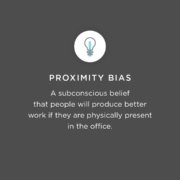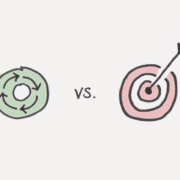Talking About Your Mental Health with Your Employer
Up to 80% of people will experience a diagnosable mental health condition over the course of their lifetime, whether they know it or not. The prevalence of symptoms is the same from the C-suite to individual contributors, but almost 60% of employees have never spoken to anyone at work about their mental health status. Even though managers, direct reports, and colleagues have been more vulnerable than ever due to shared societal challenges and the blurring of the personal and professional during the past 18 months, the effects of stigma can still loom large.
If you’re struggling with managing your mental health, you know it can become more difficult to keep up with work duties, among any other responsibilities on your plate.
While these aren’t always easy conversations to have, it may be helpful to talk to your employer about your struggles so that you can partner with your boss, co-workers, direct reports, or human resources department to find solutions that help you feel better and take greater control of your mental health.
The truth is, maybe that’s because while there are sometimes clues to highlight when we’re going through a tough time mentally—appearing teary, withdrawn, maybe even agitated—most of the time, there is no external signal to signpost when someone is struggling. Really, the only way we can know how each of us is feeling is by talking to each other. But, for many us, our mental health can feel like a hugely private part who we are. It can seem easier to put on a facade and pretend that everything’s A-Okay—even when it’s not.
It’s understandable to think that, particularly in a work environment, admitting that you’re struggling is showing a sign of weakness. But, actually, I think it’s one of the greatest forms of strength. Showing your vulnerabilities makes you a strong person.
Why Employees Don’t Talk about Mental Health
Mental health stigma can be a barrier for employees who wish to talk openly about their treatment and condition. There are several reasons an employee might not wish to disclose a mental illness, including:
- Fear of losing their job or missing out on a promotion;
- Worry over co-workers and their managers judging them;
- Risk of being misunderstood;
- Not wanting to be seen as being given special treatment;
- Witnessing harassment or bullying of others who have talked about mental health.
When employees don’t talk about mental health, it can have a ripple effect. They might avoid seeking treatment if they can’t take time off to go to therapy appointments. Employees who feel misunderstood can feel isolated and their relationships with their co-workers can suffer. Mental health is a spectrum that we all go back and forth on, just like physical health. Most of us fluctuate between stress, burnout, and diagnosable conditions like depression or anxiety depending on what’s happening in our lives. While it may feel harder to disclose bipolar disorder than burnout, everyone should be able to relate on some level.
This has never been truer than it has been over the last 18 months, between the stressors of the pandemic, racial trauma, and more. Managers, direct reports, and colleagues have been more vulnerable and authentic than ever due to shared societal challenges and the blurring of the personal and professional with remote work. We’ve also benefited from the courage of Simone Biles, Naomi Osaka, and Prince Harry and Meghan Markle. Not only did they choose to share their mental health challenges on a public stage, but they also made difficult decisions that put their well-being first.
That said, the effects of stigma can still loom large. Self-stigma tells you that you’re weak and should be ashamed of your anxiety and depression. Societal stigma tells you that you would be judged and that professional repercussions would follow if you disclosed.
Should You Tell Your Employer?
There can be a variety of intrinsic and extrinsic concerns to consider if you are contemplating talking to your employer about your mental health challenges.
A 2018 journal article provides a systematic review of the literature to help you understand why you may need to navigate these discussions differently depending on circumstances. Factors that impact the decision to disclose or conceal mental health challenges may include:
- Potential stigma
- Personal characteristics of a boss
- Relationship with employer
- Mental health of the employee
- Perceptions of mental illness
- Fears about losing control
When struggling with mental health, it can even be difficult to think clearly, so it helps to really spend time considering a proper course of action.
A 2015 study looked into how people manage their mental health information at work. This research found that men, people participating in supported employment programs, recipients of disability benefits, people with a thorough knowledge of applicable legislation, those with fewer negative experiences regarding stigma, and people who report more severe illness were increasingly likely to disclose mental health challenges at their workplace.
Talking With Your Boss
It can feel intimidating to talk to your boss regarding challenges with mental health, especially when so many people rely on their jobs for an income to survive.
This insight aligns well with the evidence from a 2020 journal article based on focus groups with people with mental health concerns human resources practitioners, employers, accommodations professionals, and advocates.
This research found that people benefitted from considering who they should share their mental health challenges with, as well as the content, timing, and communication style used in their disclosure.
Speaking With Your Direct Reports
When speaking with the employees you supervise directly, it can be useful to think about exactly what they need to know to complete their responsibilities and how your mental health may impact them. Maintain professionalism by being brief, to the point, and clear about exactly what your request or concern is. There’s no need to amplify your experience or be overly emotional in order to get others to understand.
If anything, being open with those that report to you may just encourage more dialogue about your team’s mental health and foster a healthier working relationship.
Given our current situation knowing that your colleagues or employees are best suited for this new scenario we find ourselves in. Finding the right talent, the best fit for the job and your organisation can be a very challenging task. It is now important to find out whether your managers or your team is well-equipped of working together from various locations. It requires deep knowledge of their personalities, strengths, weaknesses, interests, work style and other characteristics. Our technology and solutions will do the work for you, helping you discover if your people are resilient during times of hardship, if they are autonomous, if they are team players, without actual human contact. Given that our platform is cloud-based, everyone can use it from home as well. Humanity finds itself at a crossroad for various reasons now, why not help people discover and develop themselves from the comfort of their own homes?
Request a free demo:

Sources:
https://www.thecheckinproject.org/post/how-to-talk-about-mental-health-with-your-employer
https://www.psycom.net/how-to-talk-to-your-boss-about-your-mental-health/
https://hbr.org/2021/07/how-to-talk-about-your-mental-health-with-your-employer?





 Great People Inside
Great People Inside 




